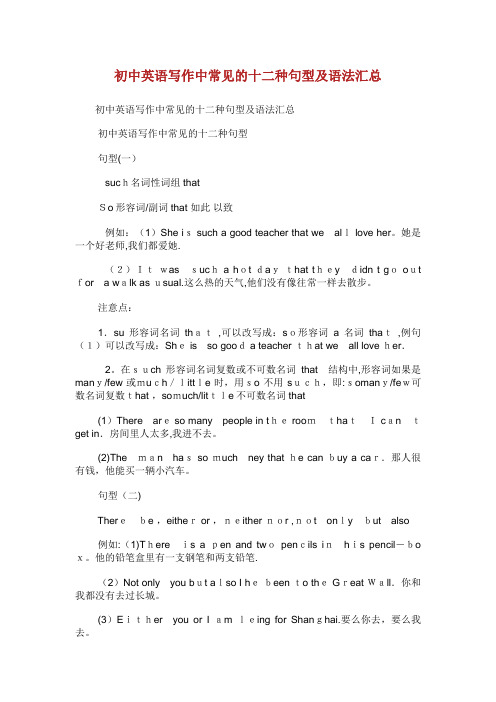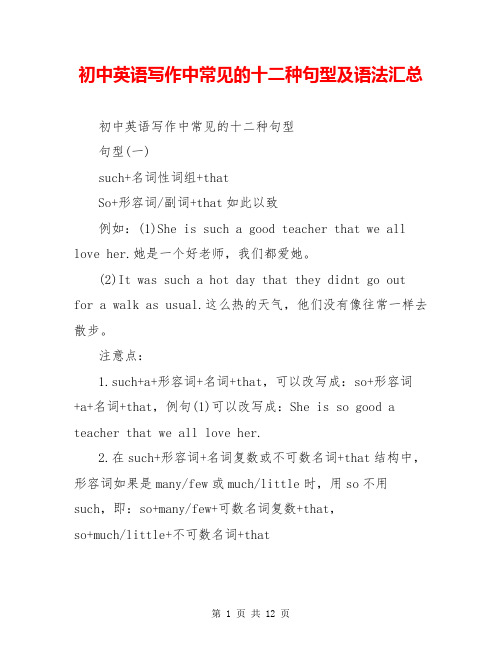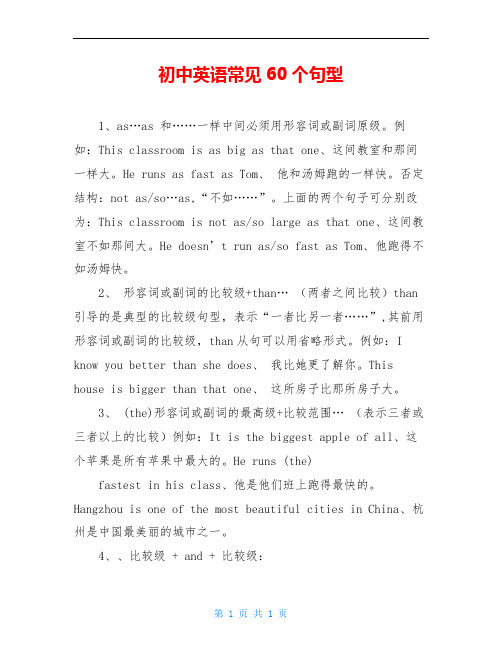初中英语常见句型.doc
[初中英语简单句的九大写作句型]初中英语简单句
![[初中英语简单句的九大写作句型]初中英语简单句](https://img.taocdn.com/s3/m/9f1f5d0ca8956bec0875e330.png)
[初中英语简单句的九大写作句型]初中英语简单句1. “主语 + 谓语”(即“主谓”句型)这一句型英汉语言结构形式完全相同,说明“某人或某物如何动作”,或者说“某人或某物自身怎样运动”。
例:They arrived in Harbin yesterday morning.分析:“他们”(主语)“到了”(谓语动作)。
The earth turns around the sun.地球围绕太阳转。
The sun rises in the east, and sets in the west.太阳东升西落。
2. “主语 + 谓语 + 宾语”(即“主谓宾”句型)这一句型英汉语言的结构形式完全相同,用以说明“某人或某物做什么事情”,或者说“某人或某物发出了动作,并且其动作涉及到另一个人或物”。
例:I study English.分析:“我”(主语)“学习”(谓语动作)“英语”(宾语即动作涉及的对象)。
I like swimming.我喜欢游泳。
3. “主语 + 谓语 + 间接宾语 + 直接宾语”(即“主谓双宾”句型)这一句型英汉语序结构相同,说明“某人为谁(间接宾语为人)做某事”,或者说“某人或物的运动涉及到两个对象,其中一个间接对象为人,另一个为物”。
例:Our teacher taught us English.分析:“我们的老师”(主语)“教”(谓语动作)“我们”(间接宾语)“英语”(直接宾语)。
4. “主语 + 谓语 + 宾语 + 宾语补足语”(即“主谓宾补”句型)这一句型说明“某人或某物要求(使、让)某人做什么”或“某人感觉某人或物怎么样”。
例: He asked her to go there.分析:“他”(主语)“要求”(谓语动作)“她”(宾语即动作涉及的对象)“去那里”(补语—补充说明宾语应做什么)。
5. “主语 + have + 宾语”(即“拥有”句型)这一句型主要用于说明“某人或某物拥有什么(宾语,即有形或无形的资源)”。
初中英语写作中常见的十二种句型及语法汇总

初中英语写作中常见的十二种句型及语法汇总初中英语写作中常见的十二种句型及语法汇总初中英语写作中常见的十二种句型句型(一)such名词性词组thatSo形容词/副词that 如此以致例如:(1)She is such a good teacher that we all love her。
她是一个好老师,我们都爱她.(2)Itwassuch a hot daythat theydidn t go out for a walk as usual.这么热的天气,他们没有像往常一样去散步。
注意点:1.su形容词名词that,可以改写成:so形容词a名词that,例句(1)可以改写成:She is so good a teacher that we all love her.2。
在such形容词名词复数或不可数名词that结构中,形容词如果是many/few或much/little时,用so不用such,即:somany/few可数名词复数that ,somuch/little不可数名词that(1)There are so many people in the roomthatI cantget in.房间里人太多,我进不去。
(2)Theman has so much ney that he can buy a car.那人很有钱,他能买一辆小汽车。
句型(二)Therebe ,either or ,neither nor ,not onlybut also例如:(1)Thereis a pen and twopencils inhis pencil-bo x。
他的铅笔盒里有一支钢笔和两支铅笔.(2)Not only you but also I hebeen to the Great Wall.你和我都没有去过长城。
(3)Either you or I am leing for Shanghai.要么你去,要么我去。
初中英语写作中常见的十二种句型及语法汇总

初中英语写作中常见的十二种句型及语法汇总初中英语写作中常见的十二种句型句型(一)such+名词性词组+thatSo+形容词/副词+that如此以致例如:(1)She is such a good teacher that we all love her.她是一个好老师,我们都爱她。
(2)It was such a hot day that they didnt go out for a walk as usual.这么热的天气,他们没有像往常一样去散步。
注意点:1.such+a+形容词+名词+that,可以改写成:so+形容词+a+名词+that,例句(1)可以改写成:She is so good a teacher that we all love her.2.在such+形容词+名词复数或不可数名词+that结构中,形容词如果是many/few或much/little时,用so不用such,即:so+many/few+可数名词复数+that,so+much/little+不可数名词+that(1)There are so many people in the room that I cant get in.房间里人太多,我进不去。
(2)The man has so much money that he can buy a car.那人很有钱,他能买一辆小汽车。
句型(二)There be,eitheror,neithernor,not onlybut also例如:(1)There is a pen and two pencils in his pencil-box.他的铅笔盒里有一支钢笔和两支铅笔。
(2)Not only you but also I have been to the Great Wall.你和我都没有去过长城。
(3)Either you or I am leaving for Shanghai.要么你去上海,要么我去上海。
初中英语常见60个句型

初中英语常见60个句型1、as…as 和……一样中间必须用形容词或副词原级。
例如:This classroom is as big as that one、这间教室和那间一样大。
He runs as fast as Tom、他和汤姆跑的一样快。
否定结构:not as/so…as,“不如……”。
上面的两个句子可分别改为:This classroom is not as/so large as that one、这间教室不如那间大。
He doesn’t run as/so fast as Tom、他跑得不如汤姆快。
2、形容词或副词的比较级+than… (两者之间比较)than 引导的是典型的比较级句型,表示“一者比另一者……”,其前用形容词或副词的比较级,than从句可以用省略形式。
例如:I know you better than she does、我比她更了解你。
This house is bigger than that one、这所房子比那所房子大。
3、 (the)形容词或副词的最高级+比较范围… (表示三者或三者以上的比较)例如:It is the biggest apple of all、这个苹果是所有苹果中最大的。
He runs (the)fastest in his class、他是他们班上跑得最快的。
Hangzhou is one of the most beautiful cities in China、杭州是中国最美丽的城市之一。
4、、比较级 + and + 比较级:越来越、、、、、、若形容词/副词为双音节词及多音节词,则这一结构变为“more and more +形容词/副词”。
例如:It’s getting warmer and warmer、天气变得越来越暖和了。
The little girl becomes more and more beautiful、小女孩变得越来越漂亮了。
初中英语简单句的九大基本句型

初中英语简单句的九大基本句型一、简洁句的九大基本句型1. 主语+ 谓语(即主谓句型)这一句型英汉语言结构形式完全相同,说明某人或某物如何动作,或者说某人或某物自身怎样运动。
例:They arrived in Harbin yesterday morning.分析:他们(主语)到了(谓语动作)。
The earth turns around the sun.地球围绕太阳转。
The sun rises in the east, and sets in the west.太阳东升西落。
2. 主语+ 谓语+ 宾语(即主谓宾句型)这一句型英汉语言的结构形式完全相同,用以说明某人或某物做什么事情,或者说某人或某物发出了动作,并且其动作涉及到另一个人或物。
例:I study English.分析:我(主语)学习(谓语动作)英语(宾语即动作涉及的对象)。
I like swimming.我喜爱游泳。
3. 主语+ 谓语+ 间接宾语+ 直接宾语(即主谓双宾句型)这一句型英汉语序结构相同,说明某人为谁(间接宾语为人)做某事,或者说某人或物的运动涉及到两个对象,其中一个间接对象为人,另一个为物。
例:Our teacher taught us English.分析:我们的老师(主语)教(谓语动作)我们(间接宾语)英语(直接宾语)。
4. 主语+ 谓语+ 宾语+ 宾语补足语(即主谓宾补句型)这一句型说明某人或某物要求(使、让)某人做什么或某人感觉某人或物怎么样。
例:He asked her to go there.分析:他(主语)要求(谓语动作)她(宾语即动作涉及的对象)去那里(补语补充说明宾语应做什么)。
5. 主语+ have + 宾语(即拥有句型)这一句型主要用于说明某人或某物拥有什么(宾语,即有形或无形的资源)。
例:You have a nice watch. 你有一块秀丽的手表分析:你拥有一块秀丽的手表,即你拥有一个可以准时且秀丽的器具。
初中英语必考短语句型

必考短语句型1.beafraidofsth恐惧,害怕……beafraidtodosth恐惧,害怕做……I'mafraidtogooutatnight.我害怕晚上出去。
Exercisingishelpfultoyourbady.锻炼对你的身体有好处。
7.begoodto对…好8.bebadfor对......有害Readingbooksinthesunisbadforyoureyes.在太阳下看书对你的眼睛不好。
9.beglad+todosth/从句很高兴......10.behappytodo很高兴做某事11.besorrytodosth对于做......而抱歉/遗憾12.besorrytohearthat...遗憾听说......13.besureofdoingsth对做某事有信心16.getreadyforsth./todosth.getreadyforsth.意为“为某事做准备”;getreadytodosth.意为“准备做某事”Wearegettingreadyforthemeeting.我们正在为会议做准备。
Theyweregettingreadytohaveasportsmeetatthatmoment.他们那时正准备开运动会。
17.hopetodosth希望做某事18.ask...for…向…要…asksbtodosth让某人做某事asksbnottodo叫某人不要做某事19.helpsbwithsth帮助某人某事tellsbsthMothertoldmetogoshoppingwithher. tellsbnottodosth让某人不要做某事25.showsb.sth.把某物给某人看showsth.tosb.把某物给某人看Pleaseshowthemaptome.26.passsb.sth.把某物递给某人Passmethecupoftea.passsth.tosb.把某物递给某人Passthecupofteatome.27.buysb.sth.为某人买某物.Motherboughtmeabike.①②③33.practice+doing练习做某事34.feellikedoingsth.想要做某事LinTaoisbusymakingamodelplane.林涛正忙着做飞机模型。
初中英语作文常用句型及短语
初中英语作文常用句型及短语英语作文是初中英语学习的重要部分,通过写作可以锻炼语言表达能力和逻辑思维能力。
想要写好英语作文,一个重要的方面就是灵活运用各种句型和短语。
下面我们来介绍一些常用的句型和短语,希望对你的写作有所帮助。
一、句型1. On one hand, on the other hand. 一方面,另一方面。
例句:On one hand, studying hard can help improve our grades. On the other hand, we should also pay attention to our physical health.2. It is well known that... 众所周知,...例句:It is well known that regular exercise is good for our health.3. There is no doubt that... 毫无疑问,...例句:There is no doubt that reading can broaden our horizons.4. In my opinion, ... 在我看来,...例句:In my opinion, learning a foreign language is very important.5. As far as I'm concerned, ... 就我个人而言,...例句:As far as I'm concerned, music is a great way to relax.6. It is believed that... 人们相信,...例句:It is believed that hard work leads to success.7. Nowadays, ... 如今,...例句:Nowadays, more and more people are using smartphones.8. With the development of society, ... 随着社会的发展,...例句:With the development of society, people's lives have become more convenient.二、短语1. In conclusion 总之例句:In conclusion, we should take advantage of our time and work hard.2. As a result 结果例句:He studied hard for the exam, and as a result, he got a high score.3. According to 根据例句:According to the survey, most students prefer playing sports to watching TV.4. It's worth noting that 值得注意的是例句:It's worth noting that learning from mistakes is important for personal growth.5. In addition 此外例句:In addition, we should also take care of the environment.6. On the contrary 相反地例句:Many people think that money is the key to happiness, but on the contrary, it is not true.7. In my point of view 在我看来例句:In my point of view, a healthy lifestyle is the foundation of success.8. In a word 总而言之例句:In a word, practice makes perfect.通过运用这些常用的句型和短语,我们可以使我们的英语作文更加丰富多样,更具有说服力。
初中英语句型结构大全
初中英语句型结构大全一、名词句型1. 主语 + 系动词 + 表语- My brother is a teacher.- The movie was interesting.2. 主语 + 动词 + 名词- They bought a new car.- I cook dinner every day.3. 主语 + 动词 + 名词 + 介词短语- She plays the guitar in her free time.- We visited the museum on Saturday.4. 主语 + 动词 + 双宾语- He gave me a present.- They showed us their new house.5. 主语 + 动词 + 宾语 + 宾语补足语- We elected him class monitor.- She made her mother proud.6. 主语 + 动词 + 不定式- I want to learn how to swim.- He needs to finish his homework.7. 主语 + 动词 + 动名词- They enjoy swimming in the lake.- She loves reading books.8. 主语 + 动词 + 不定式/动名词 + 宾语- I heard him sing a song.- I watched her play basketball.9. there be 句型- There is a cat on the tree.- There are some apples in the basket.二、形容词句型1. 主语 + be + 形容词- She is beautiful.- It is cold today.2. 主语 + be + 名词 + 形容词- He is a hardworking student.- They are happy children.3. 主语 + be + 形容词 + 不定式/动名词- The book is interesting to read. - The movie is exciting to watch.4. 主语 + 动词 + 形容词- I find the story very interesting. - We consider it important to study.5. 主语 + 动词 + 名词 + 形容词- They made me feel proud of myself. - She found the movie boring.6. 主语 + 动词 + 形容词 + 宾语- We keep our classroom clean.- He made his sister happy.三、副词句型1. 主语 + 动词 + 副词- He runs fast.- She speaks English fluently.2. 主语 + be + 副词- The weather is really nice.- The food smells delicious.3. 主语 + 动词 + 形容词 + 副词- They sing beautifully.- He plays tennis well.4. 主语 + 动词 + 副词 + 宾语- I eat breakfast early in the morning.- They finished their work quickly.四、介词句型1. 动词 + 介词 + 宾语- She looks at herself in the mirror.- He listens to music every evening.2. 形容词/副词 + 介词 + 宾语- She is afraid of spiders.- The cat jumps onto the table.3. 名词/代词 + 介词 + 名词/代词- I gave the book to him.- She borrowed a pen from me.五、连接词句型1. 并列连词- She is smart and beautiful.- He likes playing basketball but hates swimming.2. 结果连词- She studied hard, so she passed the exam.- He didn't study, therefore he failed the test.3. 条件连词- If it rains tomorrow, we will stay indoors.- Unless you finish your homework, you can't play video games.4. 原因连词- He is tired because he stayed up late last night.- We missed the bus as we woke up late.5. 转折连词- He is nice, but sometimes he can be mean.- I love ice cream; however, I am lactose intolerant.6. 让步连词- Although it was raining, they went hiking.- Despite feeling tired, she continued to work.六、从句句型1. 名词性从句- What she said is true.- Whether he will come or not is uncertain.2. 定语从句- The book that she lent me is very interesting.- The girl who won the race is my friend.3. 状语从句- I will go to the party if I have time.- She cried because she failed the test.以上是初中英语常用的句型结构,包括名词句型、形容词句型、副词句型、介词句型、连接词句型和从句句型。
初中英语重要句型及语法
初中英语重要句型及语法编辑整理:尊敬的读者朋友们:这里是精品文档编辑中心,本文档内容是由我和我的同事精心编辑整理后发布的,发布之前我们对文中内容进行仔细校对,但是难免会有疏漏的地方,但是任然希望(初中英语重要句型及语法)的内容能够给您的工作和学习带来便利。
同时也真诚的希望收到您的建议和反馈,这将是我们进步的源泉,前进的动力。
本文可编辑可修改,如果觉得对您有帮助请收藏以便随时查阅,最后祝您生活愉快业绩进步,以下为初中英语重要句型及语法的全部内容。
初中英语重要句型及语法1.wanttodosth。
=wouldliketodosth=feellikedoingsth想做某事wantsbtodosth。
=wouldlikesbtodosth想要某人做某事2.enjoydoingsth.=likedongsth=lovedongsth喜欢做某事(习惯,爱好)liketodosth喜欢去做某事(具体某一次)3.holdontodosth.继续做某事goondoingsth。
继续做某事continuedoingsth。
继续做某事considerdoingsth.考虑做某事giveupdoingsth.放弃做某事can’thelpdoingsth.忍不住做某事practicedoingsth.练习做某事finishdoingsth.完成某事have/has/hadfundoingsth。
某事很快乐haveexperiencedoing在做某事有经验begindoingsth开始做某事startdoingsth开始做某事spendtimedoingsth。
花时间做某事bebusydoingsth.忙着做某事makealivingdoingsth。
以……谋生。
haveadifficulttimedoingsth。
做…….难haveaproblemdoingsth。
做…….难havetroubledoingsth.做……。
初中常见的用英语提建议的句型_打印
英语中的提建议和回答一、用“Let’s +动词原形+其它”来表示“让我们……”它的否定形式为“Let’s not +动词原形”如:Let’s play football.让我们踢足球去吧!否定形式:Let’s not play football.不要去踢足球了。
值得注意的是:Let’s 开头的句子和Let us开头的句子,所表示的意思是不一样的。
Let’s…表示“让我们做某事”时,包含说话双方在内。
它的反意疑问句的后半部分用shall we;而Let us在表示“让我们做某事”时,不包括对方在内。
它的反意疑问句的后半部分用will you.如:Let’s go shopping ,shall we?咱们去购物好吗?Let us go , will you?让我们去吧,好吗?二、用“Why don’t you/they/we+动词原形+其它”,表示为什么不……?它的缩略形式为“Why not +动词原形”,两者在意义上是一致的。
如:Why don’t you have a try?=Why not have a try?为什么不试一试?三、用“主语+had better+动词原形+其它”,表示“最好……”它经常用在口语中,它的否定形式是在had better 后直接加not.如:You’d better (not) go to school by bus.你最好(不要)乘公共汽车去学校。
四、用“Don’t + 动词原形”,来表示“不要……”,是否定的祈使句,通常表示建议对方“不要做……”,如:Don’t play fire.不要玩火。
五、用“Shall we+动词原形+其它?”,来表示征求对方意见或建议对方做……。
如:What a sunny day! Shall we go hiking ?多好的天呀!我们去远足好吗?六、用“Will/Would/Could you please +动词原形+其它?”来表示“请你……好吗?”其中would, could 并不是动词的过去式,而是表示更委婉的建议和请求。
- 1、下载文档前请自行甄别文档内容的完整性,平台不提供额外的编辑、内容补充、找答案等附加服务。
- 2、"仅部分预览"的文档,不可在线预览部分如存在完整性等问题,可反馈申请退款(可完整预览的文档不适用该条件!)。
- 3、如文档侵犯您的权益,请联系客服反馈,我们会尽快为您处理(人工客服工作时间:9:00-18:30)。
英语常见固定句型
一、和to do 连用的固定搭配
ask sb. to do sth. 请求某人做某事
be pleased /be glad to do sth。很高兴做某事
can't wait to do sth. 迫不及待地做某事
can't afford to do sth. 不能担负起干某事
decide to do sth. 决定做某事
do/try one's best to do sth。尽全力做某事
do nothing to do sth. 对……无能为力
deserve to do sth. 值得干某事
形容词/副词+enough to do sth. 足以做某事
encourage sb. to do sth. 鼓励某人做某事
find + it + 形容词 +to do sth. 发现做某事……
get ready to do sth. 准备做某事
go on to do sth. 继续做某事
hope to do sth. 希望做某事
improve sth. to do sth. 改善/提高某物来干某事
invite sb. to do sth. 邀请某人干某事
It's better to do sth. 干某事比较好
It's time to do sth. 到该做某事的时间了。
like to do sth. 喜欢做某事……
like sb. to do sth. 喜欢某人做某事
love to do sth. 爱做某事
learn to do sth. 学会做某事
make one's mind to do sth. 下决心做某事
make a list of five ways to do sth. 列出干某事的五种方式的清单
need to do sth. 需要做某事
plan to do sth. 计划干某事
prefer to do sth.+ rather than do sth. 喜欢……不喜欢……
refuse to do sth. 拒绝干某事
remember to do 记得要去做某事
The best time to do sth. is… 干某事的最佳时间是……
stop to do sth. 停下来去做另一件事
start/begin to do sth. 开始做某事
seem to do sth. 似乎要做某事
tell sb. to do sth. 告诉某人做某事
too…to do sth. 太……以致于不能……
try to do sth. 努力/试着去做……
think it nessary for sb. to do sth. 认为某人有必要干某事
There's no time to do sth. 没时间做某事
teach sb. (how) to do sth. 教某人干某事
used to do sth. 过去常常干某事 wish sb. to do sth. 希望某人做某事
would love to do sth. 很愿意做某事
would like (sb。) to do sth. 想让某人做某事
want to do sth. 想做某事
二、和doing 连用的固定搭配
watch sb. doing sth. 观看某人正在做……
stop doing sth. 停止做某事
remember doing sth. 记得已做过某事
try doing sth. 努力/试着去做……
like doing sth. 喜欢做某事
forget doing sth. 忘记已做过某事
go on doing sth. 继续做某事
be busy doing sth. 忙于做某事
be worth doing sth. 某事值得一做
carry on doing sth. 继续做某事
couldn't help doing sth. 忍不住做某事
enjoy doing sth. 喜欢做某事 feel sb. doing sth. 感觉某人正在做某事
finish doing sth. 完成某事
feel like doing sth. 想做某事
go hiking 远足
give up doing sth. 放弃做某事
have fun doing sth. 感到做某事很有乐趣
have problems doing sth. 做某事遇到了很多问题
hear sb. doing sth. 听见某人正在做某事
hate doing sth. 不喜欢做某事
keep on doing sth. /keep doing sth. 持续做某事
mind doing sth. 介意做某事
make it possible by doing sth. 使做某事成为可能
prevent sb. from doing sth. 阻止某人干某事
practise doing sth. 练习做某事
prefer doing sth. to doing sth. 宁愿做… …也不做… …
stop sb.from doing sth. 阻止某人干某事
see sb. doing sth. 看见某人正在干某事
There be sb./sth. doing sth. 某地有某人或某物正在做某事
Thank sb. for doing sth. 谢谢某人做了某事
take an active part in doing sth. 积极参加做某事
use sth. for doing sth. 用某物做某事 (be used to do sth。)
What about doing sth.? 做某事怎么样?
without doing sth. 没有干某事
work all night doing sth. 工作整晚做某事
三、和 do 连用的固定搭配
hear sb. do sth. 听见某人做过做某事 (sb. be heard to do sth。)
watch sb. do sth. 观看某人做了……
feel sb. do sth. 感觉某人做了某事
have sb. do sth. 使得某人做某事
had better + (not) do sth. 最好做(不做)某事
let sb. do sth. 让某人做某事
make sb. do sth. 使某人做某事 (sb. be made to do sth。)
Why not do sth? 为何不做某事?
